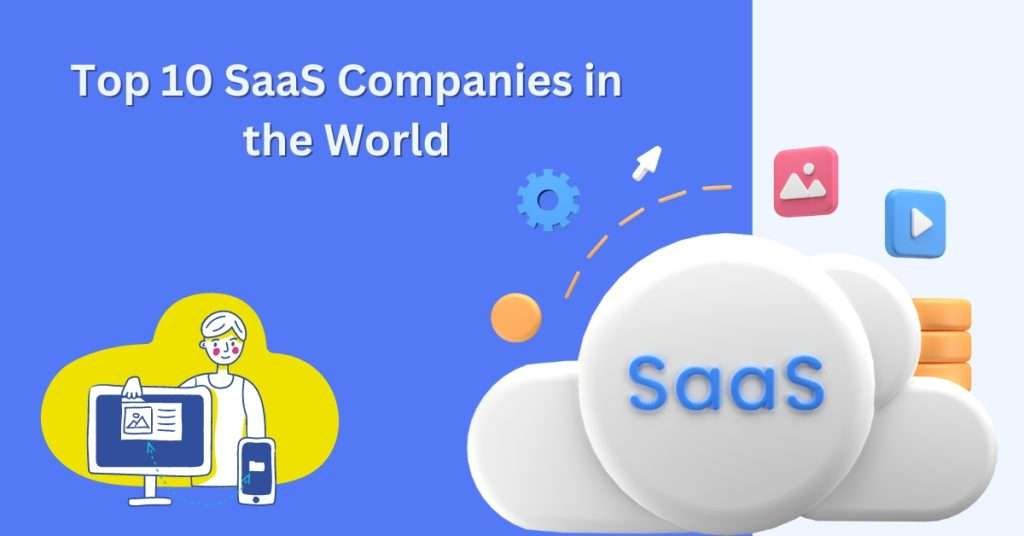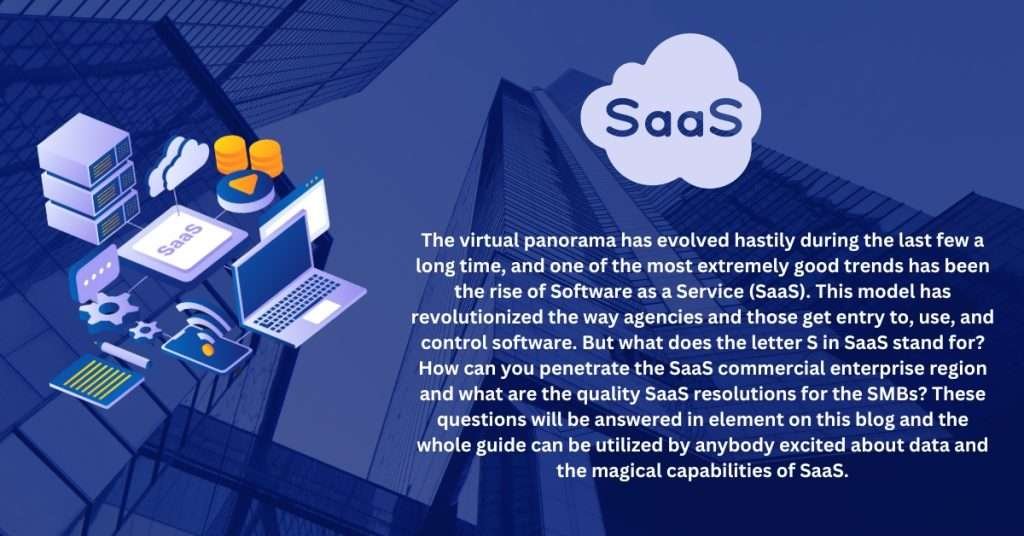The virtual panorama has evolved hastily during the last few a long time, and one of the most extremely good trends has been the rise of Software as a Service (SaaS). This model has revolutionized the way agencies and those get entry to, use, and control software. But what does the letter S in SaaS stand for? How can you penetrate the SaaS commercial enterprise region and what are the quality SaaS resolutions for the SMBs? These questions will be answered in element on this blog and the whole guide can be utilized by anybody excited about data and the magical capabilities of SaaS.
What is SaaS (Software as a Service
Software as a Service (SaaS) is an kind of software program delivery model in which applications are offered to clients on line through software program employer or dealer. While the conventional software packages can only be run on a computer or network after the buyer has purchased a license and installed the software onto the structures or the server, SaaS applications are normally subscription-primarily based solely and are accessed through use of the internet.
Key Characteristics of SaaS
- Cloud-Based Delivery: SaaS packages are hosted at the cloud, this means that clients can get proper of entry to them from everywhere with an internet connection. This eliminates the need for on-premises hardware and reduces the complexity of software program software software protection.
- Subscription Model: Most SaaS answers are supplied on a subscription basis, with customers paying a routine rate to use the software software software program. This model is first-rate for organizations as it permits for predictable fees and easy scaling.
- Automatic Updates: SaaS providers control the software program, which encompass updates and patches. This method customers constantly have get entry to to the contemporary capabilities without having to manually replace or reinstall the software program.
- Multi-Tenancy: SaaS solutions are often built on a multi-tenant architecture, where a unmarried instance of the software program serves a couple of clients. This technique permits for efficient useful resource use and decreased fees.
Accessibility: SaaS applications are commonly handy from any device with internet get right of entry to, providing flexibility and luxury for customers.
Benefits of SaaS
- Cost-Efficiency: SaaS receives rid of the want for massive prematurely investments in software program licenses and hardware. Instead, companies can pick out a subscription version that aligns with their price range.
- Scalability: SaaS solutions can effortlessly scale with the growth of a commercial enterprise. Users can add or take away subscriptions as wished, making it a bendy choice for groups of all sizes.
- Ease of Use: With SaaS, there may be no want for complicated installations or configurations. Users can rapid get started out with minimal training.
- Accessibility and Collaboration: SaaS programs are accessible from anywhere, making it simpler for agencies to collaborate, notwithstanding the reality that they may be in different places.
- Security: SaaS carriers typically make investments closely in protection, imparting strong information safety measures that is probably fee-prohibitive for character businesses to enforce on their very own.
How can do saas business
Starting a SaaS (Software as a Service) enterprise involves several key steps that focus on presenting software answers via the cloud.
Here’s a quick guide on how you can get commenced:
- Identify a Niche: Begin by way of identifying a specific problem or need in the market that your software can address. Research competition and apprehend what precise price your provider can offer. Focus on a spot where there is demand but now not an awesome quantity of opposition.
- Develop a Business Plan: Create an in depth marketing strategy outlining your enterprise desires, target marketplace, revenue version, and advertising method. This plan ought to additionally cover your pricing method, which could consist of subscription fashions, tiered pricing, or freemium alternatives.
- Build the Product: Start growing your software program. This may be done in-house or by way of way of outsourcing improvement to a software software improvement group. The product must be patron-pleasant, scalable, and steady. Consider the use of cloud systems like AWS, Google Cloud, or Microsoft Azure to host your software program.
- Implement a Marketing Strategy: Marketing is critical in attracting customers to your platform. Utilize digital advertising techniques at the side of seek engine advertising, content advertising and advertising and marketing, and social media to generate leads. Offering loose trials or freemium versions also can entice capability customers and permit them to enjoy your product before committing.
- Focus on Customer Support and Feedback: Customer aid is essential in SaaS. Provide tremendous customer support to hold customers and collect comments to constantly improve your product. Consider imposing a CRM gadget to manipulate client relationships correctly.
- Monitor and Optimize: Continuously reveal your enterprise overall performance, analyze key metrics, and make adjustments as wanted. SaaS organizations thrive on continuous development, so staying agile and aware of marketplace modifications is important.

Top 10 SaaS Companies in the World
1. Microsoft
Microsoft offers a complete SaaS solution tailor-made for small to medium-sized businesses, offering equipment like Office 365, Azure, and Dynamics 365.
Features:
- Seamless integration across Microsoft merchandise
- Scalable cloud infrastructure
- Robust security and compliance capabilities
- Collaboration gear like Teams and SharePoint
Pros:
- Reliable overall performance and uptime
- Strong customer support
- Flexible pricing fashions
Cons:
- Can be costly for smaller agencies
- Steeper getting to know curve for non-technical customers
Price:
Microsoft 365 Business Basic | Microsoft 365 Business Standard | Microsoft 365 Business Premium | Microsoft 365 Apps for business |
$6 | $12.50 | $22 | $8.25 |
2. Adobe
Adobe offers a flexible SaaS suite, together with Creative Cloud, Acrobat DC, and Adobe Sign, perfect for small to medium-sized companies.
Features:
- Access to enterprise-main creative equipment
- Cloud-primarily based document management
- Collaborative structures for group initiatives
- Regular updates and new capabilities
Pros:
- High-first-class, expert-grade equipment
- Seamless integration throughout Adobe merchandise
- Scalable plans for developing groups
Cons:
- Subscription fees can add up
- Resource-intensive software program requires sturdy hardware
Price:
Photoshop | Photography | Creative Cloud All Apps |
$22.99 | $19.99 | $59.99 |
3. Shopify
Shopify gives a robust e-commerce platform as a SaaS answer, ideal for small to medium-sized organizations.
Features:
- User-friendly on line keep builder
- Integrated payment processing
- Extensive app atmosphere
- Mobile-responsive designs
Pros:
- Easy to installation and control
- Scalable with various pricing plans
- Strong customer support and network
- Secure and reliable web hosting
Cons:
- Transaction prices except the usage of Shopify Payments
- Limited customization with out coding information
- Costs can increase with apps and add-ons
Price:
Basic | Shopify | Advanced | Plus |
$19 | $49 | $299 | $2300 |
4. Salesforce
Salesforce provides a complete CRM platform tailor-made for small to medium-sized groups.
Features:
- Advanced CRM functionalities
- Customizable dashboards and reviews
- Automation equipment for sales and advertising
- Integration with severa third-celebration programs
Pros:
- Highly customizable to match diverse enterprise wishes
- Strong analytics and reporting talents
- Scalable as agencies grow
- Excellent customer service
Cons:
- High mastering curve for brand new customers
- Expensive, in particular with extra features
- Can be complex to set up and configure
Price:
Enterprise | Unlimited | Einstein 1 Sales |
$165 | $330 | $500 |
5. Mailchimp
Mailchimp offers an intuitive e-mail advertising platform appropriate for small to medium-sized groups.
Features:
- Email marketing campaign advent and automation
- Advanced analytics and reporting
- Integration with diverse e-trade structures
- Easy-to-use drag-and-drop editor
Pros:
- User-pleasant interface
- Affordable pricing with a free tier
- Strong automation and segmentation abilties
- Comprehensive reporting equipment
Cons:
- Limited functions on the loose plan
- Can emerge as high-priced with extra subscribers
- Basic CRM functions in comparison to devoted CRM gear
Price:
Premium | Standard | Essentials |
$350 | $20 | $13 |
6. Google
Google gives a set of SaaS answers, together with Google Workspace and Google Cloud, designed for small to medium-sized agencies.
Features:
- Collaborative tools like Google Docs, Sheets, and Drive
- Scalable cloud garage and computing services
- Integrated email and calendar with Gmail
- Advanced safety and admin controls
Pros:
- Seamless integration across Google products
- Affordable pricing with bendy plans
- User-pleasant and intuitive interfaces
- Robust collaboration capabilities
Cons:
- Limited superior capabilities in comparison to some competition
- Can be hard to integrate with non-Google services
- Data privateness worries
Price:
Starter | Standard | Business Plus |
$6 | $12 | $18 |
7. GitHub
GitHub offers a main platform for model manipulate and collaboration, tailored for small to medium-sized companies.
Features:
- Git-primarily based model control for code
- Collaboration tools like pull requests and code evaluations
- Integration with various development equipment and CI/CD pipelines
- Extensive repository control
Pros:
Robust model manage and code management
Strong network and guide
Seamless integration with many improvement equipment
Free tier with essential functions
Cons:
- Learning curve for new users
- Advanced capabilities can be costly
- Public repositories might also divulge touchy code
Price:
Free | Team | Enterprise |
$0 | $4 | $21 |
8. Zoom
Zoom offers a powerful video conferencing platform ideal for small to medium-sized organizations.
Features:
- High-great video and audio conferencing
- Screen sharing and recording skills
- Integrated chat and webinar equipment
- Virtual backgrounds and breakout rooms
Pros:
- Easy to apply with a sincere interface
- Reliable performance with minimal downtime
- Flexible pricing plans with a robust free tier
- Strong safety capabilities
Cons:
- Can experience occasional connectivity issues
- Advanced features require better-tier plans
- Potential safety concerns if not properly controlled
Price:
Free | Pro | Business |
$0 | $12 | $18 |
9. Zendesk
Zendesk presents a comprehensive customer service platform tailor-made for small to medium-sized businesses.
Features:
- Multi-channel aid (e-mail, chat, cellphone, social media)
- Customizable ticketing device
- Automated workflows and AI-pushed insights
- Detailed reporting and analytics
Pros:
- Intuitive and person-pleasant interface
- Scalable with a number plans and accessories
- Strong integration abilties with other tools
- Excellent customer support and resources
Cons:
- Can grow to be costly with additional features and customers
- Initial setup and customization can be complicated
- Limited features on lower-tier plans
Overall, Zendesk is a sturdy and scalable answer for coping with customer service, although charges and setup complexity can be considerations.
Price:
Team | Growth | Professional |
$55 | $89 | $115 |
10. Workday
Workday gives an included suite of HR and monetary control gear designed for small to medium-sized businesses.
Features:
- Unified HR, payroll, and monetary control
- Real-time analytics and reporting
- Mobile get right of entry to and person-friendly interface
- Flexible and scalable answers
Pros:
- Comprehensive and intuitive platform
- Strong reporting and records analytics abilties
- Excellent customer support and schooling
- Scalable as business wishes grow
Cons:
- Can be high-priced for smaller companies
- Implementation and customization can be complex
- Learning curve for new customers
Overall, Workday provides a powerful, scalable answer for coping with HR and finances but may also contain huge funding and complexity.
Price:
Starts at $99 per user, per month. |

Conclusion
SaaS, or Software as a Service, is a version where software is brought over the internet, making it reachable from everywhere and lowering the want for complicated installations. Starting a SaaS business includes identifying a niche, developing a sturdy product, and enforcing powerful advertising strategies. For small to medium-sized corporations, top SaaS alternatives consist of Salesforce for CRM, Shopify for e-trade, and Zoom for verbal exchange. Embracing SaaS can streamline operations and foster increase—an thrilling opportunity for companies aiming to innovate and thrive.







